The 10 Best Firebase Alternatives in 2026 (Open-Source, Cheaper & Self-Hosted Options)

Last updated: January 2026
Looking for the best Firebase alternatives in 2026? This guide explores the top 10 platforms that developers are adopting to overcome Firebase’s challenges—such as vendor lock-in, unpredictable pricing, and limited hosting flexibility.
We’ll highlight industry-leading solutions like Back4App, AWS Amplify, Backendless, Kuzzle, Supabase, Appwrite, Nhost, Xano, PocketBase, and Hasura. Each offers distinct advantages, from open-source transparency and multi-cloud deployment to SQL support, GraphQL APIs, and real-time functionality.
Whether you’re building mobile, web, or IoT applications, this comparison will help you identify the right backend platform to scale your app efficiently while maintaining control and cost predictability.
Contents
- 1 Key Takeaways
- 2 Firebase Overview
- 3 Why Look for Firebase Alternatives?
- 4 How We Selected These Firebase Alternatives
- 5 Top 10 Firebase Alternatives in 2026
- 6 Back4App
- 7 AWS Amplify
- 8 Backendless
- 9 Kuzzle
- 10 Supabase
- 11 Appwrite
- 12 Nhost
- 13 Xano
- 14 PocketBase
- 15 Hasura
- 16 Other Firebase Competitors
- 17 User Reviews & Ratings
- 18 Firebase Alternatives Comparison
- 19 Conclusion
- 20 FAQ
- 21 What are the best alternatives to Firebase?
- 22 Why do developers look for Firebase alternatives?
- 23 Which Firebase alternative offers the best free plan?
- 24 Is there an open-source version of Firebase?
- 25 Which Firebase alternative is cheaper than Firebase?
Key Takeaways
- This guide covers free, open-source, self-hosted, and cheaper Firebase alternatives so teams can choose a backend aligned with their budget and infrastructure strategy.
- Developers are moving beyond Firebase due to challenges like vendor lock-in, unpredictable costs, and limited hosting flexibility within Google Cloud.
- The top Firebase alternatives for 2026 include Back4App, Supabase, Appwrite, and AWS Amplify, offering open-source foundations, scalable infrastructure, and predictable pricing.
- Modern backend platforms now combine AI integration, GraphQL and REST APIs, real-time data, and multi-cloud deployment, empowering developers to build faster and scale more efficiently.
Firebase Overview
Firebase, Google’s cloud-based app development platform, offers a robust suite of tools to build, deploy, and scale mobile and web applications with ease.
It includes NoSQL databases (Cloud Firestore & Realtime Database), real-time data synchronization, hosting, user authentication, file storage, analytics, and machine-learning-enabled services.
Beyond these core features, Firebase in 2026 has added cutting-edge enhancements:
- The newly launched Firebase Studio provides an AI-driven, browser-based development environment that lets teams prototype, deploy, and maintain full-stack apps from one workspace.
- With Firebase Data Connect, Firebase now supports managed SQL (PostgreSQL via Cloud SQL), GraphQL-based schemas, and type-safe SDKs—bridging traditional backend paradigms with Firebase’s serverless heritage.
- The platform’s AI capabilities—such as the Genkit framework and integration with the Gemini Developer API—support on-device and cloud inference, image generation, and live voice/text interactions via the new “AI Logic” SDK.
However, despite these advances, key challenges remain—such as vendor lock-in, pricing transparency at scale, and a primarily Google-Cloud-centric hosting model—which is driving many teams to evaluate alternatives.
Why Look for Firebase Alternatives?
While Firebase offers a powerful suite of tools, many developers have concerns about its pricing model, vendor lock-in, and dependence on Google Cloud.
Community discussions (including Reddit and developer forums) emphasize the need for more flexible, open-source, and self-hostable alternatives that provide greater transparency and control.
Key issues often mentioned include limitations of the free tier, difficulties with complex queries, and data-privacy challenges in certain regions, such as China.
As a result, many teams are turning to platforms that provide predictable pricing, multi-cloud or on-premise deployment, and open-source flexibility.
It’s Not Open-Source & Has Vendor Lock-in
Being a closed-source platform, Firebase restricts code-level access and customization. This vendor lock-in can make it difficult to migrate or modify backends as applications evolve, which limits flexibility for teams that need full control of their infrastructure.
Complex, Unpredictable Pricing Model
Firebase’s Blaze plan follows a pay-as-you-go model that can lead to unforeseen cost spikes as applications scale, particularly for database reads, writes, and bandwidth. The discontinuation of the fixed-price Flame plan in 2020 has increased pricing unpredictability, making budgeting harder for growing projects.
Limited to GCP Hosting
Firebase exclusively runs on Google Cloud Platform, restricting developers who prefer multi-cloud, hybrid, or on-premise hosting. This limitation can create compliance and scalability issues for global applications that must meet specific regional data-residency requirements.
Compliance and data sovereignty
Many organizations must comply with strict regulations (HIPAA, PCI, or regional data-residency rules). Because Firebase is tightly coupled to Google Cloud, teams sometimes struggle to meet location-specific requirements or run workloads in sovereign or private environments. Alternatives that support self-hosting or multi-cloud architectures give companies more control over where and how data is stored.
How We Selected These Firebase Alternatives
These platforms were evaluated based on architecture (SQL/NoSQL), hosting options (cloud, self-hosted, or on-premise), open-source availability, pricing transparency, real-time and GraphQL support, AI readiness, community adoption, and reviews.
Top 10 Firebase Alternatives in 2026
After reviewing current docs, pricing pages, and community feedback, these 10 Firebase alternatives address common challenges like vendor lock-in, cost predictability, and hosting flexibility, while adding modern capabilities such as GraphQL, NoSQL and SQL support, realtime, and multi-cloud/self-hosted deployment.
Here is the list with the best alternatives to Firebase:
- Back4App – Open-source foundation, multi-cloud, BaaS.
- AWS Amplify – AWS-native full-stack development.
- Backendless – Low-code visual BaaS.
- Kuzzle – Open-source, IoT-focused backend.
- Supabase – Postgres-based, open-source Firebase alternative.
- Appwrite – Self-hosted / cloud backend platform.
- Nhost – Postgres + GraphQL-first backend.
- Xano – Visual backend with PostgreSQL and AI workflows.
- PocketBase – Lightweight, single-binary backend.
- Hasura – High-performance GraphQL API layer.
The following sections provide an in-depth look at each platform, covering the best budget-friendly, self-hosted, and open-source Firebase alternatives to help you choose the most suitable backend for your application.
Back4App
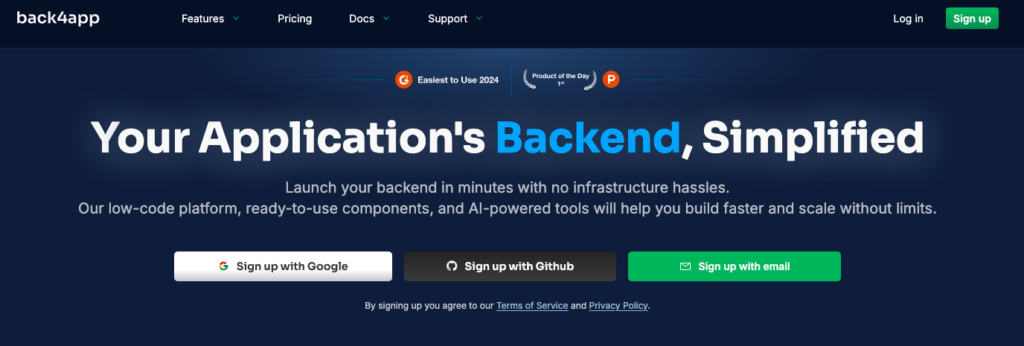
Back4App is a reliable, open-source-foundation backend-as-a-service platform built on top of open-source technologies like Parse Server.
It enables developers to build and scale applications quickly with auto-generated REST and GraphQL APIs, real-time data synchronization, user authentication, file storage, and serverless cloud functions—without managing infrastructure.
The platform’s low-code dashboard and intuitive data browser make backend management straightforward, while multi-platform SDKs simplify integration across web, mobile, and IoT environments.
Back4App runs on MongoDB (via MongoDB Atlas or DigitalOcean Managed Databases), offering a flexible and scalable NoSQL data layer that adapts to applications of any size.
Many developers choose Back4App to avoid vendor lock-in and for its multi-cloud and on-premise deployment options, ensuring complete control over their infrastructure.
Pricing
- Free Tier – Ideal for prototyping and testing.
- Serverless Hosting – Starts at $25/month, optimized for scalable production apps.
- Dedicated Hosting – Starts at $500/month, for isolated environments and higher performance.
Core Features
Back4App’s features include a spreadsheet-like data model built on MongoDB, auto-generated REST and GraphQL APIs, serverless cloud functions, and seamless GitHub integration for automated deployment and version control.
- Real-time database using LiveQuery for instant data updates.
- Auto-generated REST and GraphQL APIs for all data models.
- Serverless cloud functions to run backend logic in JavaScript.
- Spreadsheet-like data browser for intuitive management.
- Comprehensive SDKs for web, Android, iOS, Flutter, React Native, and more.
- Continuous deployment via GitHub integration.
- Multi-cloud and on-premise options for greater flexibility and compliance control.
AI now plays a central role in Back4App’s developer experience. Teams can integrate Back4App directly into modern IDEs such as Cursor, VS Code, or Windsurf, streamlining backend generation through intelligent code assistance.
Developers can also leverage the platform’s internal AI Agent to create or extend frontends visually using Vibe Coding, an interactive AI-driven environment that connects UI design with live backend data.
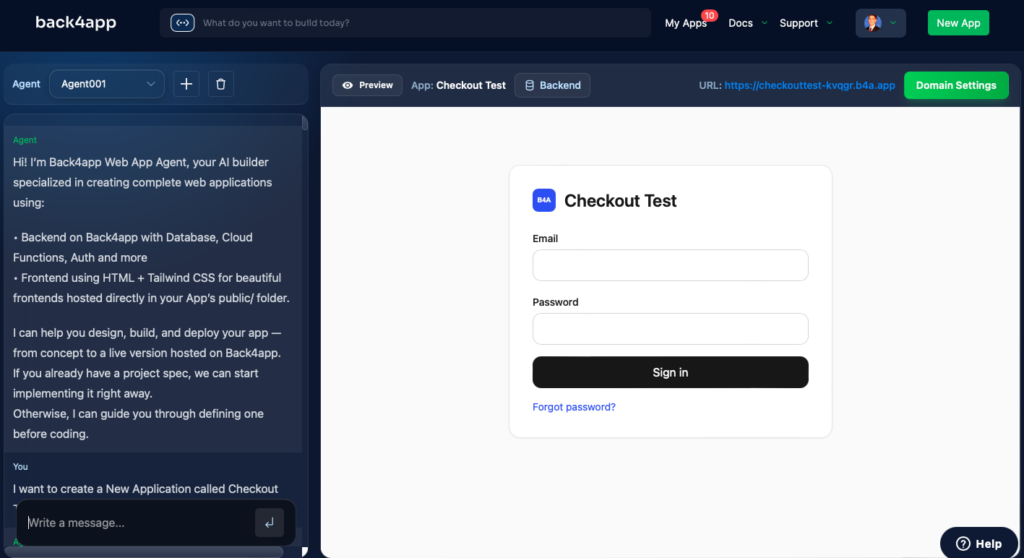
Read the article Back4App vs. Firebase to see a detailed comparison of their capabilities.
Why Use Back4App as a Firebase Alternative?
- Built on an open-source platform (Parse Server) — no vendor lock-in.
- Supports real-time updates and GraphQL APIs out of the box.
- Predictable pricing with transparent plans.
- Low-code tools speed up backend setup and management.
- Strong support and active developer community.
AWS Amplify
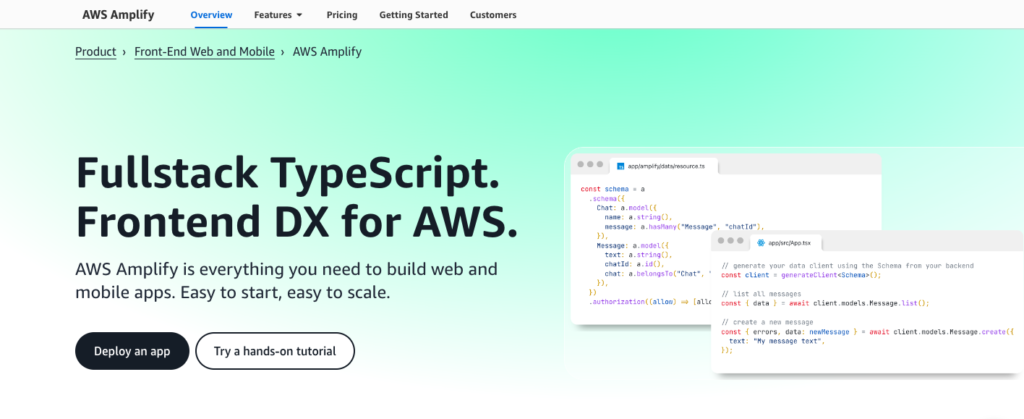
AWS Amplify is Amazon’s backend-as-a-service (BaaS) and full-stack development platform that integrates seamlessly with core AWS services such as Cognito, DynamoDB, Lambda, S3, and AppSync.
It enables developers to build and deploy scalable, secure, and cloud-native applications while automating much of the infrastructure setup.
The platform simplifies the process of managing authentication, APIs, data storage, and hosting through a unified interface and CLI. Amplify also supports continuous integration and deployment (CI/CD), automatically building and deploying code from source repositories.
While its pay-as-you-go model can vary with usage, developers value Amplify’s tight integration within the AWS ecosystem, enterprise-grade reliability, and flexibility for multi-service applications.
Pricing
- Free Tier – Suitable for small projects and testing.
- Pay-as-you-go model beyond free tier limits.
- Build and Deploy: $0.01 per build minute.
- Data Storage: $0.023 per GB per month.
- Data Transfer: $0.15 per GB served.
Core Features
AWS Amplify provides a comprehensive set of features to support modern app development and cloud deployment workflows.
- Extensive SDK and CLI for cross-platform development.
- Full-stack development support with backend and frontend integration.
- Authentication and user management through Amazon Cognito.
- GraphQL and REST APIs via AWS AppSync and API Gateway.
- Data storage with DynamoDB and S3.
- Automated CI/CD pipeline for deployment from connected repositories.
- Hosting and monitoring tools for production environments.
Why Use AWS Amplify as a Firebase Alternative?
- Backed by the AWS global infrastructure and reliability.
- Provides scalable and secure full-stack development.
- Offers deep integration with existing AWS services.
- Suitable for teams already building within the AWS ecosystem.
- Enables flexible configuration and granular control of backend components.
Backendless
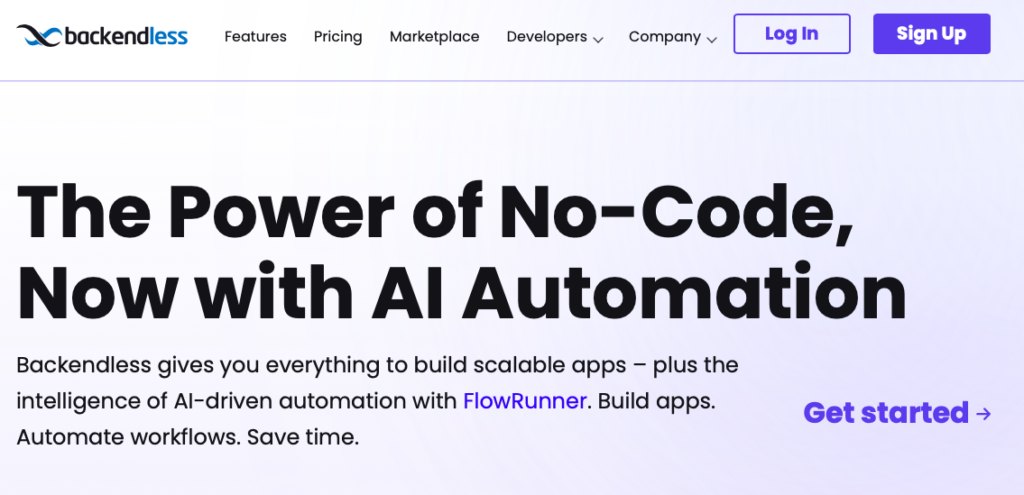
Backendless is a visual backend-as-a-service (BaaS) and low-code application development platform that supports both cloud and on-premise hosting.
It combines backend management, real-time data handling, and visual frontend building tools, allowing developers to create scalable applications with minimal code.
The platform includes a codeless logic builder, UI Builder, and data management console that make it possible to design, test, and deploy applications without extensive backend programming knowledge.
Its drag-and-drop interface, coupled with API automation and integrations with third-party platforms like Zapier, Bubble, and Integromat, accelerates app development cycles for both technical and non-technical users.
Pricing
Backendless offers several pricing categories:
- Cloud: Free tier available; paid plans start at $15/month.
- Pro – Single Server: Free license available for single-machine self-hosting; annual support and upgrades start at $7,200/year (support only) or $10,000/year (support + unlimited upgrades).
- Pro – Clustered: Includes high-availability setup (minimum three nodes) for on-premise deployments; custom pricing per enterprise requirements.
- Managed: Fully managed enterprise deployment; pricing available upon request.
Core Features
Backendless delivers a complete set of tools for creating scalable and interactive applications with minimal coding effort.
- Flexible hosting options, including Cloud, Pro (Single Server or Clustered), and Managed environments.
- Visual UI Builder for frontend design.
- Real-time database with data synchronization and advanced query support.
- Codeless Logic Builder for defining workflows and server-side logic.
- Cloud Code for executing custom functions.
- Messaging and push notifications for real-time engagement.
- File storage and content delivery with role-based access.
- Integration support via REST, GraphQL, and third-party connectors (Zapier, Bubble, Integromat).
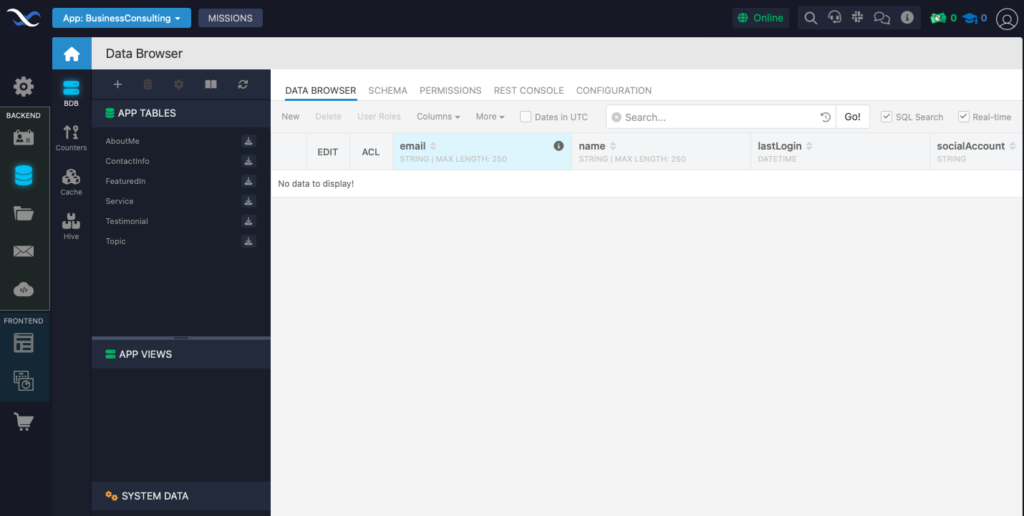
Why Use Backendless as a Firebase Alternative?
- Low-code, visual development platform suited for rapid prototyping and production apps.
- Cloud and on-premise flexibility, including free self-hosting for single-machine deployments.
- Enterprise-grade high availability through clustered configurations.
- Rich set of codeless tools for non-developers and advanced logic options for engineers. Comprehensive support and upgrade plans for long-term scalability.
Kuzzle
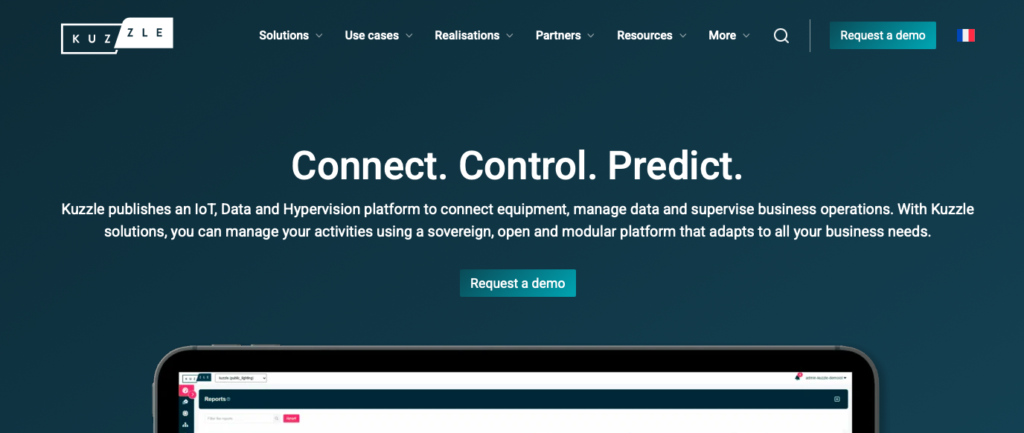
Kuzzle is a modular, open-source platform designed for IoT, web, and mobile applications. It unifies data collection, automation, and visualization through four integrated products: Kuzzle Backend, Kuzzle Data, Kuzzle IoT, and Kuzzle Hypervision.
Together, they enable scalable, real-time, and interoperable solutions that can run both on-premise and in the cloud. The platform emphasises sovereignty, interoperability, and modularity, and can run on-premise or in the cloud.
Pricing
- Not publicly available.
Features
Kuzzle delivers a unified backend stack for real-time, connected systems:
- API-first architecture with HTTP, WebSocket, and MQTT support.
- Real-time data processing and event management.
- IoT device lifecycle control and remote operations.
- Centralized data governance and security.
- Dashboarding and visualization through Hypervision.
- Flexible deployment options: on-premise or cloud.
Why Use Kuzzle as a Firebase Alternative?
- IoT-centric and open-source architecture.
- Multi-protocol communication for connected devices.
- Full sovereignty and data control through self-hosting.
- Extensible and enterprise-ready with modular design.
- Unified monitoring and visualization layer.
Supabase
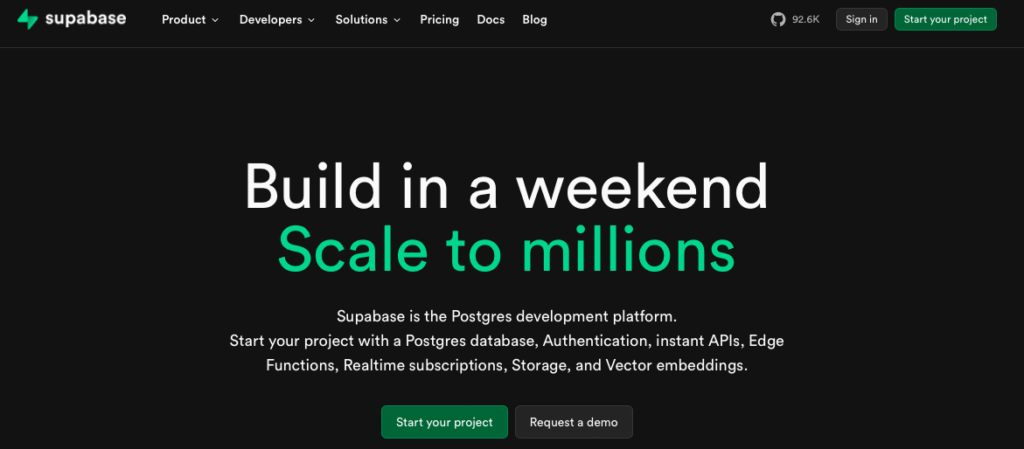
Supabase is a dynamic, open-source backend platform built on PostgreSQL, offering developers a full-stack backend alternative to Firebase.
It supports managed PostgreSQL databases, real-time subscriptions, authentication, edge functions, vector-database capabilities for AI, and deployment options either via Supabase’s cloud or self-hosting.
Pricing
- Free Tier – $0/month, ideal for prototyping and small apps.
- Pro Plan – Starts at $25/month, plus usage-based fees as you scale.
- Team Plan – Starts at $599/month, designed for larger teams and higher usage.
- Enterprise Plan – Custom pricing for mission-critical and large-scale deployments.
Features
Supabase offers a managed Postgres database, authentication, storage, edge functions, and even a vector database for AI applications.
- Managed PostgreSQL database offering REST and GraphQL APIs, real-time subscriptions, and full SQL support.
- Edge Functions (serverless) with built-in AI inference capabilities, enabling embedding generation and LLM workflows (via Supabase.ai) in functions.
- Support for vector databases using pgvector: store, index, and query embeddings and build semantic search directly inside the database.
- Deployment flexibility: Use Supabase Cloud or self-host to maintain full ownership and compliance.
Why Use Supabase as a Firebase Alternative?
- Open-source architecture that supports SQL/relational data models as well as real-time features.
- Strong developer-friendly tooling, documentation, and a large community.
- Rich support for AI and vector workflows, making it suitable for modern data and agent-based applications.
- Flexible deployment (cloud or self-host) and no vendor lock-in.
Appwrite
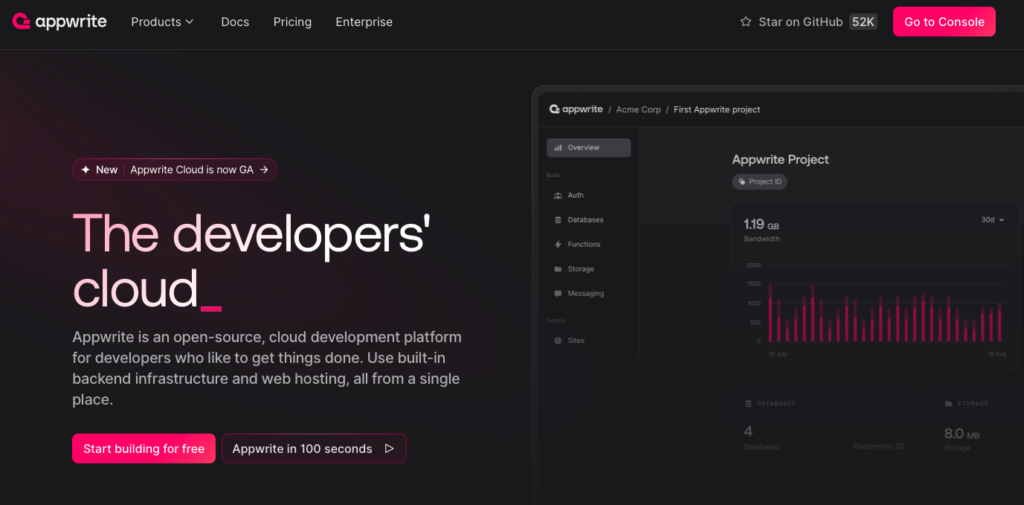
Appwrite is an open-source, cloud-ready development platform designed to provide backend services and web hosting for web, mobile, and desktop applications. It supports authentication, databases, file storage, serverless functions, APIs and web application deployment.
The platform offers deployment flexibility — either self-hosted via Docker or through Appwrite Cloud — and integrates seamlessly with modern frameworks like Flutter, React, Vue, Next.js, SvelteKit, and more.
Pricing
- Free – $0, suited for passion projects and small applications.
- Pro – From $25/month per project, for production workloads with more resources and bandwidth.
- Enterprise – Custom pricing for organizations requiring advanced compliance, dedicated support, and tailored infrastructure.
Features
Key features of Appwrite include comprehensive authentication options, a scalable database with in-memory caching, secure file storage, and integrated messaging services.
- Authentication & Accounts – User sign-up/sign-in, sessions, OAuth providers, JWT, security policies.
- Databases – MariaDB-based databases with indexed queries, collections, and flexible schema handling.
- Storage – Secure file storage and management with access control.
- Functions / Compute – Serverless functions with multiple runtimes and metered GB-hour execution for custom business logic.
- Realtime – Realtime service that allows clients to subscribe to Appwrite events (for example, database, storage, account, or function events) and receive updates automatically whenever data changes.
- Messaging – Unified push, email, and SMS messaging product for transactional and marketing communication, built on top of external providers like FCM, APNs, Mailgun, SendGrid, Twilio, and others.
- SDK Ecosystem – Official SDKs for JavaScript, Flutter/Dart, Apple (Swift), Android (Kotlin/Java), .NET, Python, Node.js, and more.
Why Use Appwrite as a Firebase Alternative?
- Open-source and self-hostable, avoiding strict vendor lock-in.
- Strong support for authentication, storage, and document databases in one platform.
- Realtime APIs and Messaging support event-driven updates and multi-channel user communication.
- Cloud and self-hosted deployment options, with the same core APIs. Growing developer ecosystem and documentation, making it attractive for modern app stacks.
Nhost
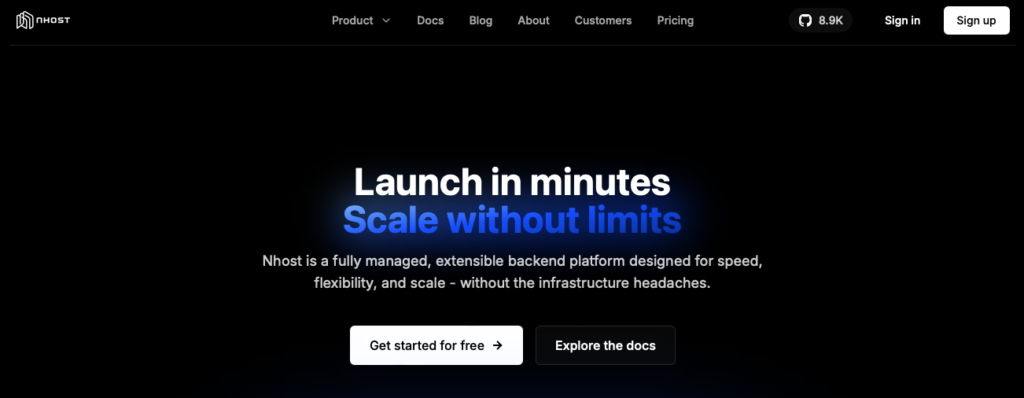
Nhost is a fully managed, open-source backend platform engineered for speed, flexibility, and scale.
Built on a PostgreSQL foundation and leveraging a GraphQL-first architecture, it delivers a production-ready backend stack—including database, real-time APIs, authentication, storage, and serverless functions—while offering deployment options via Nhost Cloud or self-hosting.
Pricing
- Starter Plan – $0/month
- Pro Plan – From $25/month
- Team Plan – From $599/month
- Enterprise Plan – Custom Pricing
Features
Nhost delivers a complete backend environment with a strong emphasis on efficiency, performance, and developer experience.
- Flexible deployment options: fully managed cloud or self-hosted installations.
- Managed PostgreSQL database with support for extensions.
- Instant GraphQL APIs and real-time subscriptions powered by Hasura.
- Authentication with email/password, OAuth providers, and role-based access control.
- File storage with global CDN delivery.
- Serverless functions for backend logic using JavaScript or TypeScript.
- Ability to bring custom containers for specialized services.
- CLI tools for local development plus Git-based CI/CD workflows.
Why Use Nhost as a Firebase Alternative?
- Fully open-source stack built on PostgreSQL and GraphQL.
- Real-time capabilities and automatic API generation over a relational database.
- Avoids vendor lock-in with self-hosting and export-friendly architecture.
- Scales efficiently from small projects to enterprise workloads.
- Provides a familiar SQL data model preferred by many engineering teams.
Xano
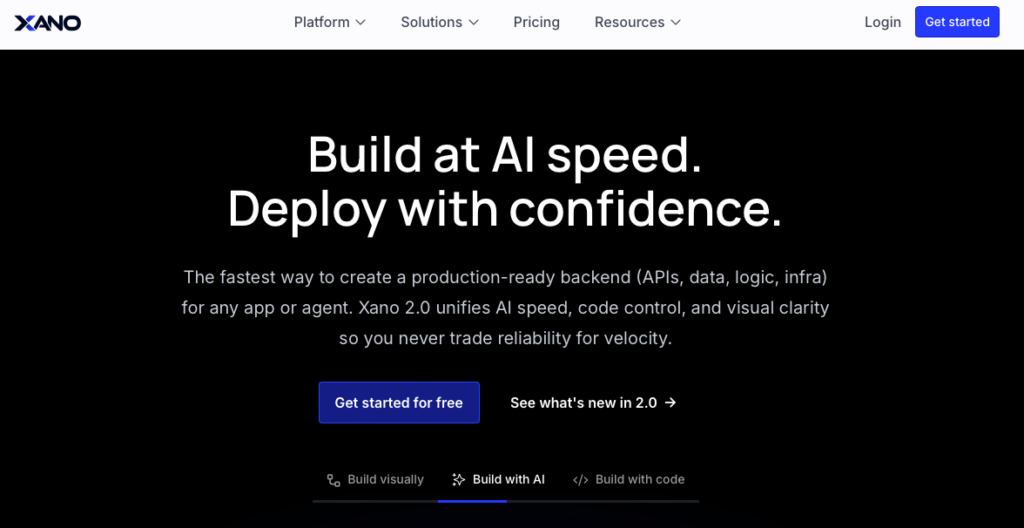
Xano is a modern backend-as-a-service platform designed to accelerate app development with minimal infrastructure overhead.
It offers a unified backend environment including API generation, database management, authentication, logic workflows, and monitoring—all accessible via a visual interface, code, or hybrid workflow.
It enables the creation of AI-ready backends, modern APIs, automated processes, and secure integrations without relying on multiple external services.
Its architecture supports agent workflows with memory and tool use, exposes legacy systems through modern interfaces, connects frontends through a single governed API, and streamlines automation through customizable logic pipelines.
Pricing
- Free plan available to evaluate and prototype.
- Paid tiers start at $25/month and scale based on project size, compute usage, and enterprise requirements
Features
The feature set is designed to support both traditional applications and modern AI-driven workloads.
- Fully managed PostgreSQL database with support for extensions and triggers.
- Instant REST and GraphQL APIs auto-generated based on the data model and logic workflows.
- Real-time channels with permissions, triggers, and message events for building live features.
- Function stacks and visual workflows to define business logic, automation, and integrations.
- AI/agent readiness, including capabilities to build intelligent agents, memory contexts, and orchestration workflows.
- Self-hosting and deployment flexibility, with managed cloud or private cloud/on-premise options for teams needing infrastructure control.
Why Use Xano as a Firebase Alternative?
- Combines visual, low-code workflows with full code flexibility, appealing to both non-technical and technical teams.
- Offers auto-generated APIs, real-time channels, and logic workflows in a unified stack—reducing the need for multiple backend services.
- Allows deployment in managed or self-hosted environments, enabling infrastructure control, compliance, and multi-cloud strategies.
- Suitable for projects that require live data updates, collaboration features, or agent-based automation rather than simple CRUD apps.
PocketBase
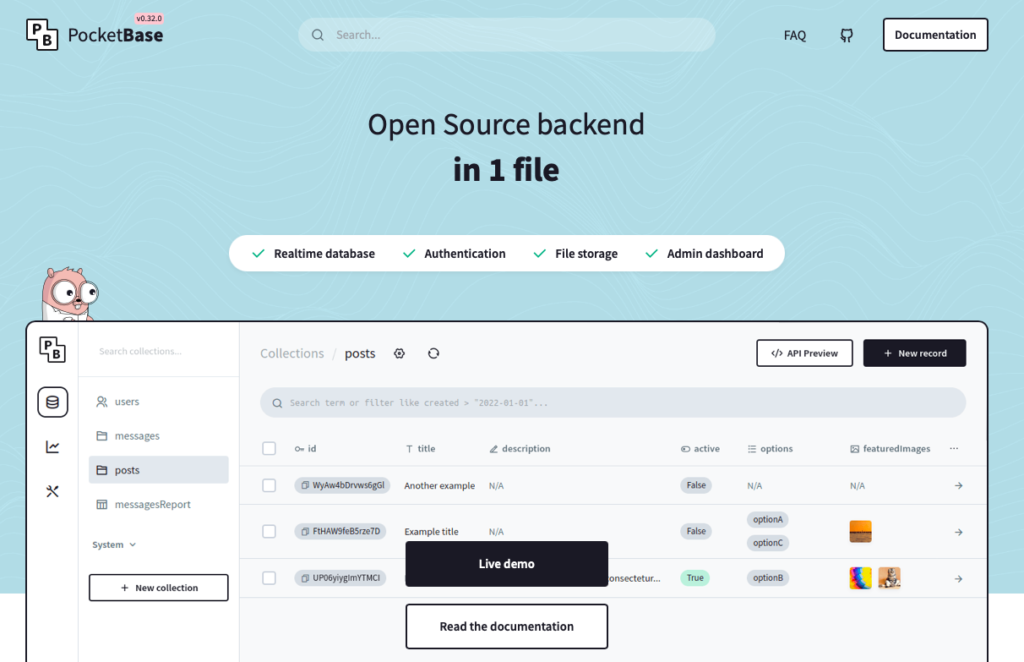
PocketBase is a modern, open-source backend platform built with Go, designed to be fast, lightweight, and easy to self-host. It provides an integrated solution combining a database, real-time API, authentication system, and file storage—all in a single executable file that runs locally or on any cloud provider.
Developers appreciate PocketBase for its simplicity and performance. Unlike many traditional BaaS solutions, it does not require complex configuration or multiple external services.
A fully functional backend can be initialized with a single command, making it suitable for side projects, prototypes, and small-to-medium-scale applications.
PocketBase includes a built-in admin dashboard for managing collections and users, real-time data synchronization over WebSockets, and a RESTful API automatically generated from defined data models.
It also supports file uploads, email authentication, and an extensible plugin system that enables customization through Go or JavaScript functions.
Pricing
- Free & Open Source – Self-hosted under the MIT License.
- Cloud Hosting (via third-party providers) – Paid options available for teams preferring managed environments.
Features
PocketBase delivers a streamlined backend experience focused on simplicity and performance. Its core features combine essential backend components—data storage, APIs, authentication, and real-time capabilities—into a single, easily deployable package.
- Single-binary backend written in Go for rapid deployment.
- Embedded SQLite database ensuring minimal setup and high performance.
- Real-time API with WebSocket support for instant data updates.
- Integrated authentication with email/password and OAuth options.
- Built-in file storage and intuitive admin dashboard.
- Extensible with Go or JavaScript for advanced custom logic.
Why Use PocketBase as a Firebase Alternative?
- Lightweight, self-contained architecture providing complete infrastructure control.
- Open-source with no vendor lock-in.
- Instant setup and minimal resource requirements.
- Well-suited for MVPs and prototypes.
Hasura

Hasura is a high-performance API platform that provides an instant, unified data access layer across multiple databases and services.
It is built around a metadata-driven architecture that automatically generates GraphQL or REST APIs from existing data sources, streamlining API development and reducing the operational burden typically associated with large-scale backend systems.
It enables teams to model domains, enforce governance, and aggregate data from distributed systems through a centralized semantic layer.
Recent advancements such as PromptQL expand Hasura’s capabilities into AI-native querying, allowing LLMs and agents to interact with data in a more natural and controlled manner.
Pricing
Hasura Cloud is available in three tiers:
- Cloud Free – Ideal for testing and small projects, including instant APIs, up to three projects, and usage-limited resources.
- Cloud Professional – A pay-as-you-go plan for production workloads, billed by active project hours and data passthrough, with support for unlimited databases and advanced performance features.
- Cloud Enterprise – Designed for high-scale and mission-critical use cases, offering dedicated infrastructure, enhanced security, compliance capabilities, and custom SLAs under an annual commitment.
Features
Hasura provides a robust feature set centered on performance, governance, and flexible data access.
- Instant GraphQL and REST APIs generated from connected databases.
- Unified semantic layer for cross-source data aggregation.
- Metadata-driven domain modeling, reducing manual API development.
- Event triggers and scheduled triggers for automation and backend logic.
- Remote schemas and connectors to integrate external APIs and microservices.
- High scalability with distributed infrastructure and query caching.
- PromptQL for AI-native querying and controlled data access for LLMs.
Why Use Hasura as a Firebase Alternative?
- Provides instant, production-grade APIs without custom backend coding.
- Offers high-performance data federation across SQL, NoSQL, and external services.
- Strong governance and security capabilities for regulated industries.
- Designed for AI-driven applications, enabling controlled access for LLMs and agents.
- Reduces API development timelines dramatically, making it suitable for enterprise modernization and new system architectures.
Other Firebase Competitors
Other notable Firebase replacements include Ably for real-time messaging, PubNub for notification systems, 8Base for AI-based development, Kinsta for managed WordPress, and Heroku for full-stack deployments. These options further illustrate the diverse ecosystem available beyond Firebase.
User Reviews & Ratings
To help you make an informed decision, here’s a quick look at what real users are saying about these Firebase competitors:
- Back4App: Rated 4.8/5 on G2 for ease of use and robust customer support.
- AWS Amplify: Earns a rating of 4.2/5 on G2, appreciated for its seamless AWS integration.
- Backendless: Recognized for its visual development tools and user-friendly interface. See reviews on G2.
- Kuzzle: Praised for its specialized IoT capabilities and open-source approach. Check feedback on G2.
- Supabase: Highly rated for fast deployment and developer-friendly documentation. Explore reviews on Product Hunt.
- Appwrite: Noted for its comprehensive feature set and intuitive setup. Read reviews on Product Hunt.
- Nhost: Known for its native GraphQL support and ease of use. See feedback on Product Hunt.
- Xano: Holds a rating of 4.8/5 on G2, with users praising its balance between no-code ease and backend power, visual API building, and scalable PostgreSQL infrastructure.
- PocketBase: Earns a 5.0/5 rating on Product Hunt with 6 reviews on the date of writing, with developers praising its speed, simplicity, and one-file architecture.
- Hasura: Praised for high-performance GraphQL APIs and versatility. View user feedback on G2.
These ratings are drawn from trusted sources like G2 and Product Hunt, offering a snapshot of each platform’s performance and user satisfaction. Be sure to check out the detailed reviews on each platform for the most current feedback.
Firebase Alternatives Comparison
| Name | Open Source | Database Type | API Model | Free Tier | Pricing Model | Managed Hosting | Deployment Options |
|---|---|---|---|---|---|---|---|
| Firebase | No | NoSQL | REST + Realtime | Yes | Pay-as-you-go | Yes | Cloud (GCP Only) |
| Back4App | Yes | NoSQL (MongoDB) | REST + GraphQL + Realtime | Yes | Subscription (from $25/mo) | Yes | Cloud + Self-Hosted |
| AWS Amplify | No | DynamoDB (Primary) | GraphQL + REST | Yes | Pay-as-you-go | Yes | Cloud (AWS Only) |
| Backendless | No | NoSQL | REST | Yes | Subscription (from $15/mo) | Yes | Cloud + Self-Hosted |
| Kuzzle | Yes | NoSQL | REST + Realtime | Yes | Custom / Support Plans | Yes | Cloud + Self-Hosted |
| Supabase | Yes | PostgreSQL | REST + GraphQL + Realtime | Yes | Subscription (from $25/mo) | Yes | Cloud + Self-Hosted |
| Appwrite | Yes | MariaDB | REST + Realtime | Yes | Subscription (from $15/mo) | Yes | Cloud + Self-Hosted |
| Nhost | Yes | PostgreSQL | GraphQL + Realtime | Yes | Subscription (from $25/mo) | Yes | Cloud + Self-Hosted |
| Xano | No | PostgreSQL | REST + Realtime | Yes | Subscription (from $25/mo) | Yes | Cloud + Self-Hosted |
| PocketBase | Yes | SQLite | REST + Realtime | Yes | Free (Self-Hosted) | No | Self-Hosted |
| Hasura | Yes | Multiple (via connectors) | GraphQL | Yes | Pay-as-you-go + Enterprise | Yes | Cloud + Self-Hosted |
Conclusion
Firebase remains a powerful and widely adopted platform, but its closed-source architecture, pricing variability, and hosting limitations encourage many developers to evaluate alternative backend solutions.
As application requirements evolve—especially with the rise of AI-driven features, real-time experiences, and flexible deployment needs—teams increasingly look for platforms that offer greater openness, control, and predictability.
This article presented ten strong Firebase alternatives that deliver modern capabilities such as native GraphQL APIs, real-time communication, SQL and NoSQL data options, self-hosting flexibility, and AI-ready tooling.
Platforms like Back4App, PocketBase, AWS Amplify, Backendless, Kuzzle, Supabase, Appwrite, Nhost, Hasura, and Xano each address specific use cases, development styles, and scalability needs.
Whether the goal is to build real-time applications, automate processes, integrate AI agents, or operate across hybrid and multi-cloud environments, these platforms provide reliable and cost-effective paths forward.
Evaluating their strengths, pricing models, and deployment options will help identify the solution that best aligns with project goals and long-term architectural strategy.
FAQ
What are the best alternatives to Firebase?
The best Firebase alternatives are Back4App, followed by Supabase, Appwrite, and AWS Amplify.
Why do developers look for Firebase alternatives?
Developers often seek Firebase alternatives to avoid vendor lock-in, pricing unpredictability, and limited hosting options. Many want open-source solutions, multi-cloud deployment, SQL database support, or advanced customization—all areas where platforms like Back4App, Supabase, and Appwrite provide greater control and transparency.
Which Firebase alternative offers the best free plan?
Several platforms offer strong free tiers, but Back4App and Supabase stand out. Back4App includes generous database, API, and hosting limits for early-stage projects, while Supabase provides free managed PostgreSQL with realtime features. Both let developers test and launch MVPs without immediate costs.
Is there an open-source version of Firebase?
While Firebase itself is proprietary, several open-source alternatives replicate its features. Back4App (built on open-source Parse), Supabase, and Appwrite all offer self-hosted or cloud-hosted options that deliver authentication, databases, and functions similar to Firebase—without platform lock-in.
Which Firebase alternative is cheaper than Firebase?
Several alternatives can be cheaper than Firebase, especially as usage grows. Back4App offers transparent subscription plans starting at predictable monthly prices, while Supabase combines a generous free tier with affordable Pro plans. For many teams, these pricing models reduce bill shock compared to Firebase’s purely usage-based charging.



